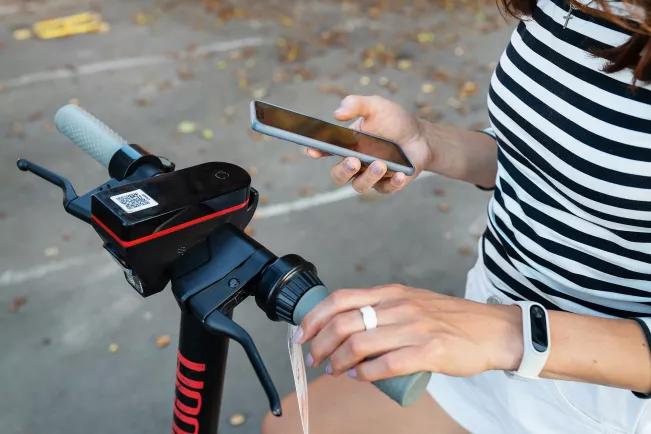Communications and Marketing
Research group wants to make sustainable mobility services more usable

In contrast to private vehicles, shared mobility describes transportation with rented objects. For some years now, bicycles, e-bikes and e-scooters, which users can rent via smartphone app, have been ubiquitous in city centers. Operators include municipal transport companies themselves as well as various private providers. This is causing problems: "In order to achieve the mobility transition towards sustainable and environmentally friendly transportation, we need a wide range of options. However, cities and local authorities are currently finding it difficult to keep track," says project manager Paul Bossauer from the Institute for Consumer Informatics (IVI) at H-BRS. For example, employees in public administrations have not yet been able to track which vehicles are at which location centrally and in real time.
The interdisciplinary research team at H-BRS and the University of Cologne wants to change this. The scientists are developing a so-called dashboard, i.e. a graphical interface on which the vehicles of all providers can be viewed. It should also be possible to easily mark parking ban zones for bicycles and scooters on the computer and send them to the providers. In addition to a better overview and more user-friendly operation, cities and local authorities want to respond to the needs of citizens to a greater extent than before: "We want to know better where and for which routes the vehicles are used. This will enable us to better dovetail and manage mobility services with public transport in the future," says Thomas Bischof, project manager for the MIAAS project at Kölner Verkehrsbetriebe (KVB), which is working with the researchers. The researchers use data from the providers without using personal user data. If a vehicle is rented, it disappears from the map and only reappears when it is parked. An initial version of the dashboard has already been completed. In the coming months, the scientists will carry out initial practical tests in Cologne, Bonn and Sankt Augustin.
"The research and development in the MIAAS project supports local authorities, transport companies and mobility providers in the needs-based planning of mobility services and greater integration with local public transport. In the long term, citizens will also benefit from a demand-oriented and sustainable mobility service," says Bossauer. The MIAAS dashboard is to be made freely accessible as open source content so that other municipalities and mobility stakeholders can also access it.
The Team
Update der Verantwortlichen für das Projekt vom 26. April 2024:
"Das Projekt MIAAS befindet sich derzeit in der Erprobungsphase, in der das entwickelte Dashboard in Bonn eingesetzt wird. Die Stadt Bonn agiert dabei als Durchführungspartner, was eine praxisnahe Zusammenarbeit zwischen der Forschungsgruppe und den kommunalen Behörden ermöglicht.
Zusätzlich arbeitet die Forschungsgruppe an einer auf Machine-Learning basierenden Prognose-Funktion, die langfristig darauf abzielt, Angebot und Nachfrage nach Shared-Mobility-Angeboten vorherzusagen, um eine effizientere und nachhaltigere Mobilitätsplanung zu ermöglichen.
Das Projektteam von MIAAS strebt weiterhin die Zusammenarbeit mit anderen Städten und Mobilitätsanbietern an. Aktuell werden weitere Erprobungen mit drei Städten aus dem Rhein-Sieg-Kreis vorbereitet. Darüber hinaus wird das Projekt kontinuierlich durch Feedback aus der Praxis verbessert."
Kontakt

Location
Sankt Augustin
Room
G 135
Address
Grantham-Allee 20
53757, Sankt Augustin
Telephone
+49 2241 / 865-9628